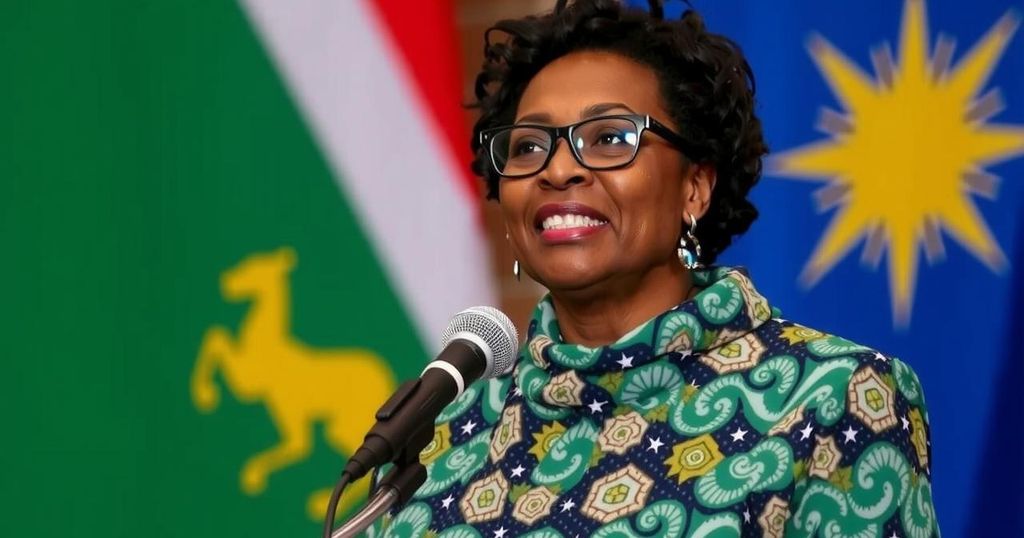Namibia Elects Its First Female President Amid Election Disputes

Namibia elected its first female president, Netumbo Nandi-Ndaitwah, with 57% of the vote in a contentious election marked by technical issues. Her victory reinforces the Swapo party’s 34-year dominance, while opposition groups plan to challenge the results in court due to alleged irregularities. Nandi-Ndaitwah’s ascent represents a significant moment for women’s political representation in Africa and defies trends of younger voters rejecting established parties in the region.
Namibia has made a significant step in its political landscape by electing its first female president, Netumbo Nandi-Ndaitwah, who was announced as the winner of the recent presidential elections. Nandi-Ndaitwah, the former vice-president, secured 57% of the votes, a result that solidifies the ruling Swapo party’s dominance, continuing its 34-year governance since independence in 1990. Upon the announcement of the results, she emphasized that the Namibian people had chosen a path of “peace and stability.”
Nandi-Ndaitwah’s political journey includes her involvement in the independence movement during the 1970s. Following the death of President Hage Geingob, she was promoted to vice-president earlier this year, making her election particularly historic. However, the election was plagued with controversies due to technical issues, including ballot shortages, leading opposition parties to reject the official results and plan legal challenges. The runner-up, Panduleni Itula, received 25.5% of the votes, a decline from his share in the previous election, while the Swapo party experienced a drop in parliamentary votes, receiving only 53%.
Nandi-Ndaitwah’s victory is significant not only for its historical context but also as it defies a broader trend in southern Africa where incumbent liberation movements face backlash from younger voters. Notably, this election occurs against the backdrop of political turbulence experienced by neighboring states, including the African National Congress in South Africa and significant changes in Botswana and Mozambique.
The election of Netumbo Nandi-Ndaitwah as the first female president of Namibia marks a pivotal moment in the country’s political history and gender representation in leadership roles. The Swapo party has been the ruling party since Namibia gained independence from apartheid South Africa in 1990, establishing a legacy of governance that has faced scrutiny and challenges over time. The recent elections reflect ongoing tensions within the political climate, where opposition parties are increasingly vocal against perceived electoral malpractices, signaling a potential shift in the political dynamics within the region. This election also highlights the significance of female leadership in African politics, especially as Nandi-Ndaitwah represents a continuity of established governance amid growing disenchantment among younger voters elsewhere in southern Africa, such as in South Africa and Botswana.
In conclusion, the election of Netumbo Nandi-Ndaitwah as Namibia’s first female president is a landmark achievement that underscores the ongoing political evolution of the nation. Despite her impressive electoral victory, the surrounding controversies suggest a contentious political environment that may influence future governance. The opposition’s challenges to the results, coupled with the changing sentiments among the electorate, indicate that Namibia’s political landscape is at a crucial juncture, potentially affecting the ruling Swapo party’s long-term hold on power.
Original Source: www.theguardian.com








